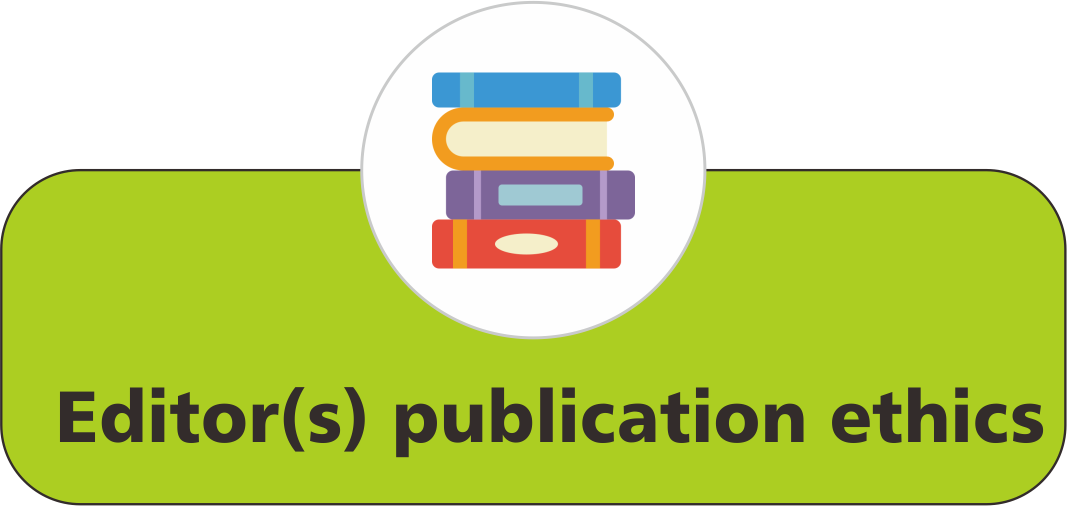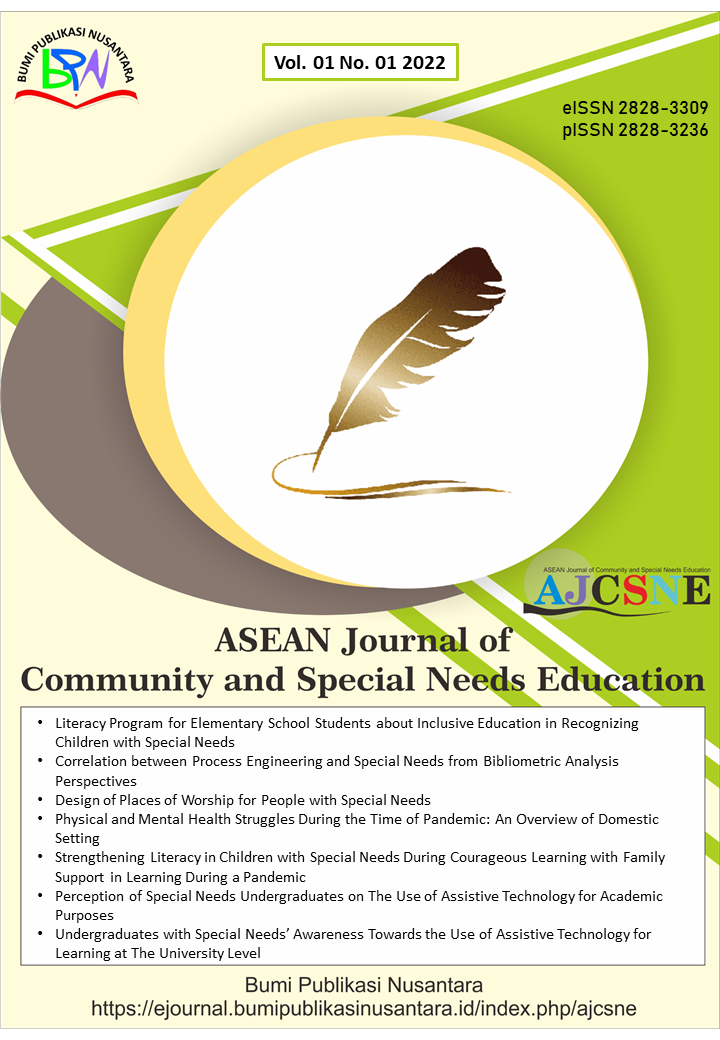School Feeding Program in Nigeria: Special Schools Experience
 ), Israel Segun Ogundele(2), Sikiru Issa Nuhu(3), Fiyinfoluwa Gbemisola Jinadu(4), Esther Oluwatimileyin Ogunfeyitimi(5),
), Israel Segun Ogundele(2), Sikiru Issa Nuhu(3), Fiyinfoluwa Gbemisola Jinadu(4), Esther Oluwatimileyin Ogunfeyitimi(5),
(1) Kwara State University
(2) Kwara State University
(3) Kwara State University
(4) Kwara State University
(5) Kwara State University
 Corresponding Author
Corresponding Author
Abstract
Keywords
References
Akanbi G. O. (2013). Home grown school feeding and health program in Nigeria: An innovative approach to boosting enrolment in public primary schools–a study of osun state, 2002–2010. African Symposium, 11(2), 8-12.
Aliyar, R., Gelli, A., and Hamdani, S. H. (2015). A review of nutritional guidelines and menu compositions for school feeding programs in 12 countries. Frontiers in Public Health, 3, 1-13.
Apriyanti, V. P. (2023). Learning abilities of students with intellectual disabilities for cooking Indonesian traditional food “opak bakar”: From step by step experiment to the analysis. Indonesian Journal of Community and Special Needs Education, 3(1). 43-54.
Azubuike, O. C., and Mbah, P. E. (2019). Challenges of child nutrition: An analysis of school feeding programs (SFP) in South Eastern Nigeria. Savanna Journal of Basic and Applied Sciences, 1(1), 104-110.
Berliana, S. W., Subekti, S., Nikmawati, E. E., and Mupita, J. (2021). Consumption analysis of children with lack nutrition at the patient health center. Indonesian Journal of Multidiciplinary Research, 1(2), 341-350.
Firman, T., and Nandiyanto, A. B. D. (2023). Effectiveness of socialization through powerpoint media to understanding nutrition of adolescents. ASEAN Journal of Science and Engineering Education , 3(3), 211-220.
Gelli, A., Masset, E., Folson, G., Kusi, A., Arhinful, D. K., Asante, F., and Drake, L. (2016). Evaluation of alternative school feeding models on nutrition, education, agriculture and other social outcomes in Ghana: Rationale, randomised design and baseline data. Trials, 17, 1-19.
Hidayatullah, W., Muktiarni, M., Mupita, J. (2022). Analysis comparative of physical fitness of students with disabilities and normal students. ASEAN Journal of Community and Special Needs Education, 1(2), 69-74.
Jomaa, L. H., McDonnell, E., and Probart, C. (2011). School feeding programs in developing countries: impacts on children's health and educational outcomes. Nutrition Reviews, 69(2), 83-98.
Kamilah, N. N., and Nandiyanto. A. B. D. (2023). Balanced eating between food and healthy food for better nutritional needs. Indonesian Journal of Educational Research and Technology, 3(3), 1-8.
Kasmana, K., Dewi, A. C., Hermiyah, M., Asifa, V., and Maulana, H. (2021). Designing multimedia applications for nutrition education and managing stress. Indonesian Journal of Teaching in Science, 1(1), 27-38.
Kristiansson, E. A., Gelli, A., Welch, V., Greenhalgh, T., Liberato, S., Francis, D. and Espejo, F. (2016). Costs and cost-outcome of school feeding programs and feeding programs for young children. Evidence and recommendations. International Journal of Educational Development, 48, 79-83.
Machmud, A., Ahman, E., Dirgantari, P.D., Waspada, I., Nandiyanto, A.B.D. (2019). Data envelopment analysis: The efficiency study of food industry in Indonesia. Journal of Engineering Science and Technology,14(1), 479-488.
Manosa, C., Pineda, C. K., Namora, J. J., and Daga-as, C. (2022). Health status of bachelor of physical education degree students amidst the Covid-19 pandemic. Indonesian Journal of Multidiciplinary Research, 2(2), 373-376.
Maulana, H., Br Ginting, S., Aryan, P., Fadillah, M., and Kamal, R. (2021). Utilization of internet of things on food supply chains in food industry. International Journal of Informatics, Information System and Computer Engineering, 2(1), 103-112.
Rana, Z. A., Ahsan, M., Ali, M., Atif, A., and Uzair, M. (2022). Food preferences and nutritional status: Insights on nutrition transition in university community. Indonesian Journal of Multidiciplinary Research, 2(1), 169-178.
Rinaldhi, R., and Nandiyanto, A. B. D. (2022). Education on the effect of malnutrition on prenatal factors for children with special needs. Indonesian Journal of Community and Special Needs Education, 2(2), 127-136.
Taylor, A. D., and Ogbogu, C. O. (2016). The effects of school feeding program on enrolment and performance of public elementary school pupils in Osun State, Nigeria. World Journal of Education, 6(3), 39-47.
Uduku. (2017). School building design for feeding program and community outreach: Insights from Ghana and South Africa. International Journal of Educational Development, 31, 59-66.
Uwameiye, B. E. and Salami, L. I. (2013). Assessment of the Impact of the UNICEF Supported school feeding program on attendance of pupils in federal capital territory. International Journal of Academic Research in Progressive Education and Development, 2(1), 209-219.
Warlina, L., Yusuf, M., Ramadhani, S. S., and Ohoitimur, G. I. (2021). Planning for relocation area of street food vendor in Bandung City. International Journal of Design, 1, 37-42.
Yendaw, E., and Dayour, F. (2015). Effect of the national school feeding program on pupils’ enrolment, attendance and retention: A case study of Nyoglo of the Savelugu-Nantong municipality, Ghana. British Journal of Education, Society and Behavioural Science, 5(3), 341-353.
Yunusa, I., Gumel, A. M., Adegbusi, K., and Adegbusi, S. (2014). School feeding program in Nigeria: A vehicle for nourishment of pupils. The African Journal, 12(2), 53-67.
Article Metrics
Abstract View : 1469 times
: 1469 times Download : 1336 times
Download : 1336 times
Refbacks
- There are currently no refbacks.
Copyright (c) 2023 Bumi Publikasi Nusantara

This work is licensed under a Creative Commons Attribution-ShareAlike 4.0 International License.







